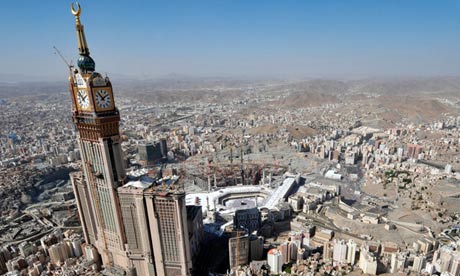NPR
 Arabian heights … the Abraj al-Bait looms over the Grand Mosque and Kaaba in Mecca, Saudi Arabia. PHOTO/Fayez Nureldine/AFP/Getty/Guardian
Arabian heights … the Abraj al-Bait looms over the Grand Mosque and Kaaba in Mecca, Saudi Arabia. PHOTO/Fayez Nureldine/AFP/Getty/Guardian
Muslims from all over the world have journeyed to Mecca for the annual Hajj. But they may find that many of the buildings around the holy area are changing. Audie Cornish speaks with Oliver Wainwright, The Guardian‘s architecture critic, for more on what’s happening to the buildings and land in Mecca.
…
CORNISH: But isn’t there an argument to be made that with the mosque enlarged, there’s housing and sanitation, facilities have been improved, transportation has been improved, I mean, isn’t this helpful to allow more pilgrims to come to the city?
WAINWRIGHT: You’re right. I mean, transportation and infrastructure is improving, but that’s coming at a great cost to the historic center. I mean, the mosque expansion, it was recently expanded to take, I think, 400,000 more people at a cost of $10 billion. But that completely destroyed the old centers, as with the most historic buildings in Mecca, and also the most historic neighborhoods where people had lived for generations, and they’ve now been completely displaced, you know, not compensated and living in shantytowns on the edge of the city.
CORNISH: Oliver, you also write about architecture around the world. And how are other governments managing this tension between development and sacred and historic sites?
WAINWRIGHT: Well, there’s a pressure all across the world. I mean, the one thing that stands in the way is UNESCO World Heritage, which does an amazing job of trying to keep these places in as close a condition to the original as possible. I mean, the problem with Saudi Arabia is that they’ve denied UNESCO the power to actually list these sites.
So I think there’s three UNESCO World Heritage sites in Saudi Arabia, none of which have any religious connotations. So they’re kind of free to do what they like. I think elsewhere, you know, there’s keen eyes on anything that happens in Jerusalem. And even if the slightest stone is upturned, there’s a kind of national outcry.
But I think with Saudi Arabia, there’s a kind of fear of criticism, partly because it’s such an authoritarian regime. And also, because it’s such a powerful country, I mean, you can’t underestimate the power of the petrol dollar and the influence that that has. So I think people are very scared of the ramifications of criticism.
NPR for more
(Thanks to reader)
